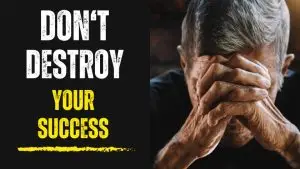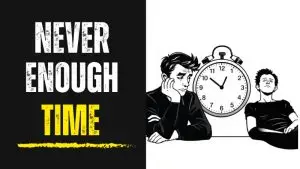The Power of Habits
Our lives are made a lot easier by using habits because they let us do things more or less without thinking.
This saves us from having to use a lot of mental energy.
However, some self sabotaging habits can do us more harm than good.
And these bad habits can mess with our money, time, health, and even our chances of success.
Yes, some of them can really hurt us.
Recognizing Self-Destructive Habits
Have you ever thought about whether or not your habits could be damaging you?
We often stick with habits because we think they are helping us in some way, even if it’s not clear to us what they are.
Why We Can’t Stop Self Sabotaging Bad Habits
Why do we keep up bad habits when we know they’re bad for us?
One reason is that they happen to feel good in the moment.
Even though we might regret it later, we often find it hard to stop.
This happens because a habit could meet the criteria of some need we have, and it’s often a need we don’t fully understand because it’s hidden deep inside us.
The Root of Our Bad Habits
A lot of self-destructive habits start as a way of dealing with something bad that has happened.
Maybe you were bullied, experienced abuse, were told to hide your feelings, or went through a tough breakup.
These bad behaviours come out as a way to handle the stress and pain.
Some common self-destructive habits are:
Talking down to yourself
Smoking
Drinking
Eating too much
Hurting yourself
Feeling sorry for yourself
Turning down help
Not taking care of your body
Pushing away people who care
Keeping your emotions insideThe Struggle with Self-Control
You might have habits you wish you could stop doing, but feel like you can’t control them.
But don’t beat yourself up over them, they don’t mean you’re weak or flawed.
It just means that you’ve learned to deal with life’s challenges in a certain way.
It’s possible that your subconscious might still be reacting to old threats, even if they’re not there anymore.
Changing Your Response to Triggers
Now, you need to figure out what triggers your bad habits and learn new ways to respond to these triggers.
Making this change can improve your life a lot.
Here’s how you can begin changing your habits:
Confront Your Emotions for Growth
Dealing with negative emotions can sometimes be tough.
And quite often it can be tempting to just ignore the bad feelings altogether.
There are some people who often fall into habits, like using certain substances, just to avoid these tough emotions.
But it’s important to let yourself feel and think about what’s bothering you.
Questioning and Reflecting on Your Discomfort
Ask yourself what you want to change.
Are you fed up with how things are going?
Often, it’s the strong wish to want to escape from these painful feelings that can drive you to make positive changes in your life.
The Problem with Avoiding Issues
Some people try to dodge their problems or even pretend they don’t exist.
They think if they don’t think about them, these issues might just magically disappear.
They might get busy with other things, which can then turn into additional habits, and in turn make their problems even worse.
So it’s crucial not to hide from your emotions and fears.
Facing Your Fears and Problems
The best course of action is to confront your emotions and challenges directly before they get out of hand.
Understanding and accepting your feelings is the first step to changing them.
Taking Small Steps Towards Change
Commit to changing your negative behaviours.
It’s okay to start small and go slow because it’s every step that really counts.
Find Yourself an Accountability Partner
It can help a great deal to have someone who can be there to keep you on track.
Try sharing your goals with a trusted family member or friend.
Let them support you and keep you responsible for your actions.
Making Your Personal Pledge
Promise yourself you will give it your best shot.
You might even want to put something important on the line to motivate yourself.
Remember, it’s not a failure if you slip up.
Just pick yourself up, dust yourself off, and soldier on.
Reach Out for Some Support
It can be important for you to have some support from those around you.
Ask your family and friends to keep an eye on you and offer a bit of encouragement, especially when things begin to get hard.
You can also find groups online with people facing similar challenges.
And you could even try offering support to others that may need some, as this may also help to boost your own journey.
Take One Step at a Time
Trying to change all your bad habits at once is not going to be realistic.
Start with just one thing you want to improve upon, get that one sorted, then progress to the next one.
Accomplishing smaller victories along the way can really build up your confidence and make the next steps feel easier.
The Power of Wanting to Change
Remember, as long as you really want to change, you can do it.
But realizing you need to change is the first and most important step.
If doing it for yourself isn’t motivating enough, find a stronger reason that will keep you committed and moving forward.






